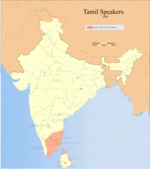
Back طب سيدها Arabic সিদ্ধ চিকিৎসা Bengali/Bangla Médecine Siddha French सिद्ध चिकित्सा HI Siddha Italian シッダ医学 Japanese ಸಿದ್ಧ ವೈದ್ಯ ಪದ್ಧತಿ KN സിദ്ധവൈദ്യം Malayalam සිද්ධායුර්වේදය SI Mjekësia Siddha SQ
| Part of a series on |
| Alternative medicine |
|---|
 |
| Part of a series on |
| Hinduism |
|---|
 |
| Part of a series on |
| Tamils |
|---|
 |
|
|
Siddha medicine is a form of traditional medicine originating in southern India.[1] It is one of the oldest systems of medicine in India.[1][2]
In rural India, siddhars have learned methods traditionally through master-disciple relationships to become local "healers" known as siddhars.[2] Siddhars are among an estimated 400,000 traditional healers practicing medicine in India, comprising some 57% of rural medical care.[3][4] Siddha practitioners believe that five basic elements[5] – earth, water, fire, air, sky – are in food, "humours" of the human body, and herbal, animal or inorganic chemical compounds, such as sulfur and mercury, used as therapies for treating diseases.[6] The Indian Medical Association regards unqualified siddhars' practices as quackery posing a danger to national health due to absence of training in science-based medicine.[3][4] Identifying fake medical practitioners without qualifications, the Supreme Court of India stated in 2018 that "unqualified, untrained quacks are posing a great risk to the entire society and playing with the lives of people without having the requisite training and education in the science from approved institutions".[7]
The Ministry of Ayurveda, Yoga and Naturopathy, Unani, Siddha and Homoeopathy of the Government of India regulates training in Siddha medicine and other traditional practices grouped collectively as AYUSH.[8] The Tamil Nadu Dr. M.G.R Medical University offers courses with advanced degrees, such as BSMS (Bachelor in Siddha Medicine and Surgery), MD (Medical Doctor, Siddha) or Doctor of Philosophy (PhD).[9][10] The Central Council of Indian Medicine, a statutory body established in 1971 under AYUSH, monitors education in areas of Indian traditional medicine, including Siddha medicine.[11] Siddha degree holders can become registered Siddha practitioners and are allowed to prescribe drugs as per the standards recorded in the Siddha Pharmacopoeia of India (SPI) under the Drugs & Cosmetics Act, 1940.[12][13] However, modern medicine prescriptions by Siddha practitioners are also considered as quackery by the Indian Medical Association.[3]
- ^ a b "Siddha medicine". Encyclopedia Britannica. Retrieved 29 November 2020.
- ^ a b "About Siddha medicine: Origins". National Institute of Siddha. 2020. Retrieved 16 February 2020.
- ^ a b c KK Aggarwal; VN Sharma (2014). "IMA Anti Quackery Wing". Indian Medical Association. Archived from the original on 31 January 2020. Retrieved 28 November 2019.
- ^ a b Michael Safi (2 January 2018). "Indian doctors protest against plan to let 'quacks' practise medicine". The Guardian. Retrieved 28 November 2019.
The government is giving sanction to quackery. If those doctors make mistakes and people pay with their lives, who is going to be held accountable?
- ^ "Siddha medicine: Basic concepts". Ministry of AYUSH, Government of India. 25 February 2016. Retrieved 16 February 2020.
- ^ "Siddha medicine: Materia medica". Ministry of AYUSH, Government of India. 25 February 2016. Retrieved 16 February 2020.
- ^ Justice RK Agrawal (13 April 2018). "Judgment by the Supreme Court of India: Kerala Ayurveda Paramparya vs State of Kerala". Supreme Court of India. Archived from the original on 9 December 2019. Retrieved 9 December 2019.
- ^ "About the Central Council for Research in Ayurvedic Sciences". Central Council for Research in Ayurvedic Sciences, Ministry of AYUSH, Government of India. 2017.
- ^ "Indian Medicine and Homoeopathy Courses - The Tamilnadu Dr.M.G.R. Medical University". www.tnmgrmu.ac.in. Retrieved 18 March 2023.
- ^ "PhD Siddha". 28 August 2021. Retrieved 18 March 2023.
- ^ Central Council of Indian Medicine
- ^ Drugs and Cosmetics Act, 1940
- ^ Siddha system of medicine